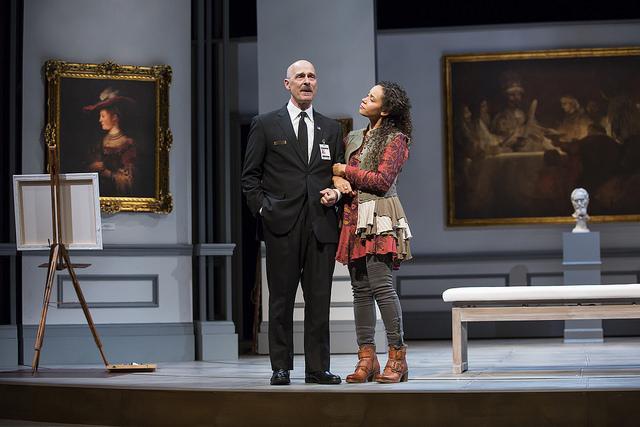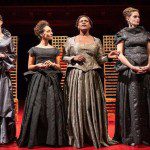Women’s Theater Festival: Observing ‘The Guard’ and ‘Elizabeth R’ and Much More
By • October 13, 2015 0 762

I have noted this before—the sheer amount of diversity of ambition, content and talent in the 50-plus play Women’s Voices Theater Festival now going on which can be gleened just by reading the titles.
It’s better to see for yourself, of course, otherwise you might miss just how some of these plays seem sometimes obviously, sometimes deceptively to match the missions of their venues, as well as the overall concept of the festival, which is to fully display the gifts of a wonderfully large group of women playwrights in the course of two months and a little more.
The recent “Women Laughing Alone With Salad” by Sheila Callaghan is a play so chock full of contemporary memes about women and women and men and gender in general that it seemed right at home on the Woolly Mammoth stage—where everything you think could pop up, usually does.
Two new plays—“The Guard” by Jessica Dickey at the Ford’s Theatre and the recently closed “texts & beheadings/Elizabeth R” created and directed by Karin Coonrod at the Folger Theatre—exemplified what this festival is all about with every play that’s on our stages during its course, which are meetings with the unexpected, new forms of theatre and theatricality and imaginations and performances that go beyond genre and gender.
At first blush, “The Guard” might seem an odd choice for the Ford’s Theatre, which nevertheless commissioned it and whose artistic directed Paul Tetreault was one of the founding movers behind the festival. “The Guard” includes some explicit language rarely and likely not ever heard in the theater—which is as much a national museum as it is a theatre—language which also seemed entirely appropriate to its characters.
That aside, the play, written with intelligence, wit and an obvious love for its characters, was a play dancing with big themes—the nature of grief, the nature of art, and the humanity of artists from aspiring copiers, to gifted poets, to Homer and Rembrandt themselves, seems entirely at home here, with its innate love of and respect for history.
Dickey, who is herself an actress as well as playwright, has tackled big themes before—as in “Charles Ives Take Me Home,” “The Amish Project,” a one-woman show about the shocking killing of Amish children, and “Row After Row,” a play about Civil War re-enactors.
“The Guard” has its focus a veteran guard at a well known museum, which houses Van Goghs and Rembrandts, including “Aristotle With a Bust of Homer.” It’s another day on the job—a young, obviously shy girl comes to copy the painting, a younger guard bursts with enthusiasm, and a new kid on the block arrives, irreverent, a street artist and a bit of a volcano. The guard—played with a tart warmth by Mitchell Hebert is distracted—his partner and husband, a well known poet, lies at home, dying.
From this situation, Dickey takes us to the world of Rembrandt—where the artist is dealing his frustrated son, his fading glory, and working on the Homer painting while plying his young mistress with gifts—and to the world of Homer himself, a bigger-than-life and quirky, quarrelsome figure played with terrific aplomb by the magnetic Craig Wallace, a Ford’s and Washington regular. In the end, we return to the guard and the love of his life Simon and you might say, so it goes, but it is much more than that.
The play has taken us places we rarely get to go in the theater before coming to an end that can be predicted but whose effects are still surprising in how they touch us. We’ve got to think about big things—art and death, and all that, and how it happens and is linked—through the lives of people we recognize as living in our world, and that’s no small achievement. And in trying also to make us see the artists—the poet Homer, the painter Rembrandt—as human beings, it makes us think of them that way, if not entirely with provable accuracy.
The staging—that movement between worlds—is accomplished with unassuming dexterity by director Sharon Otto and terrific sets by James Kronzer. The writing is smart and compassionate, and the acting is anchored by the veterans—Hebert doubles as Rembrandt and Wallace is affecting as the dying Simon.
The younger actors are up to the task—especially Kathryn Tkel who seems to radiate warmth almost naturally as both a grieving art student and Rembrandt’s lady—and Josh Sticklin as Dodger who approaches art full of brio and daring—“touch it, let’s all touch it” he says of the master’s painting.
Briefly, watching Karin Coonrod’s artful approach to Queen Elizabeth I in “texts & beheadings,” reminded me, oddly enough, of Shakespeare, here in this small temple to Shakespeare. In this production, by Compangnia de’ Colombar, Coonrod has offered up four actresses as four different Elizabeths, none of whom look like the previous stage and movie versions we’re used to seeing. Deep in our hearts, we know Elizabeth was actually Bette Davis, or Helen Mirren.
In fact, the actresses—Monique Barbee, Ayeje Feamster, Juliana Francis-Kelly and Cristina Spina (speaking at times in Italian)—amount to a woman both familiar and strange to us, ending up full-bodied and full-voiced, speaking often from poems, letters, edicts and recorded conversations by the queen.
They also ended up as an answer to a question asked many times—how did Shakespeare, the exemplary playwright of her reign, also manage to write so many modern-sounding, educated, smart, funny and strong female characters, especially in the comedies. The answer surely must be that he had a fine example of an extraordinary woman to draw from, his own queen and monarch, who was known to have a fine sense of humor (often bawdy), was strong, keenly self-aware as woman and queen, understood power.
Here in this play you heard that some woman, and who, in this place, had echoes in Rosalind, in Portia, in Lady Macbeth, and Lear’s daughters, in Juliet and Desdemona, in the queens, and in Katharine that shrew who was never truly tamed.
- Josh Sticklin as Dodger and Kathryn Tkel as Madeline in the world-premiere of “The Guard” by Jessica Dickey. Production plays at Ford’s through Oct. 18. | Photo by Scott Suchman



